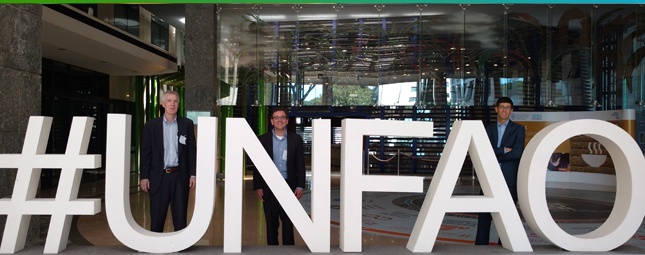Leading Global Food Waste Dialog

LeanPath Leaders Meet with FAO Representatives
Earlier this month we traveled to Italy with a multidisciplinary group of graduate students from the University of Pennsylvania’s Organizational Dynamics program as part of a collaborative educational effort to address global food waste.
The course in question, “Global Collaboration for Sustainability: The Food-Water-Energy Nexus in Italy,” focused broadly on the challenge of feeding nearly ten billion people by 2050 in a sustainable manner – and simultaneously focused more specifically on the global challenge of food waste. With estimates of annual food loss and waste totaling as much as 50% annually, it is essential that substantial, lasting, systemic solutions are implemented – and quickly – to address this wastage and the serious social, environmental, and financial costs that go along with it.
Thankfully, awareness of the global food waste problem is on the rise, and the United Nations specifically addressed food waste as part of the recently developed Sustainable Development Goals. Goal 12 calls for ensuring sustainable consumption and production patterns, and target 12.3 is a call to “by 2030, halve per capita global food waste at the retail and consumer levels and reduce food losses along production and supply chains, including post-harvest losses.”
In the U.S., familiarity with the USEPA’s Food Waste Reduction Hierarchy – which ranks options for dealing with excess food from most preferred to least preferred in an upside-down triangle – is also rising. At LeanPath, we operate at the top of that triangle where the greatest impact can be made by preventing food waste before it occurs – and before it requires additional resources to reallocate that excess elsewhere (assuming reallocation to people, animals, industrial use, or compost is even possible).
The UPenn course created a number of partnerships to address the challenge of global food waste by bringing European and U.S. perspectives together in several sessions over the course of eight days to build relationships and exchange perspectives, beginning at the UNFAO in Rome – the hub of global food security research. With thought leaders Jonathan Bloom (author of American Wasteland and the blog Wasted Food) and Andrew Shakman (co-founder and CEO of LeanPath) along as co-faculty, we participated in a deep, energizing half-day session on nexus and food waste issues with global thought leaders from FAO.
On the FAO side, Lucie Pluschke started the session with an overview of the common vision for sustainable food and agriculture, citing unprecedented resource constraints as well as five principles for sustainable food and agriculture (SFA). Stefania Bracco followed with a focus on Investing in Energy Sustainable Technologies in the Agrifood Sector (INVESTA), while Camelia Bucatariu provided an overview of the global Save Food Initiative.
From the U.S. perspective, Jonathan, Andrew and I distilled the U.S. food waste problem into three most critical areas – culture and values change, education, and prevention. I began with an overview of food waste in the U.S. with a focus on culture, values, and consumer change. Jonathan followed with a discussion of food waste in education with a focus on moving from problem to progress. Andrew summed up our session with a stirring presentation on food waste prevention from a food service and hospitality lens, pointing out that despite the fact that nothing connects us more than our food we still waste huge amounts of it – and that measurement is the key to managing (and preventing) food waste. Further, he noted that food waste is a behavioral problem, and that prevention requires everyone in the foodservice operation to consistently repeat the right behaviors.
In sum, both sides benefited from this global dialog on food waste, relationships were formed, several takeaways were noted for future action, and at the heart of it all, several highly-engaged students were inspired to become change makers for food waste reduction and prevention.
